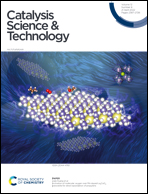Enhancing thermostability of lipase from Pseudomonas alcaligenes for producing l-menthol by the CREATE strategy†
Abstract
A lipase from Pseudomonas alcaligenes (PaL) catalyzes the hydrolysis of racemic menthol propionate to produce L-menthol, one of the most important flavouring agents in the food, cosmetic and pharmaceutical industries. However, it suffers from poor thermostability, which makes it difficult to use at elevated temperature and limits its industrial applications. In this study, a strategy named combined rational evaluation for the thermostability engineering (CREATE) was applied to stabilize PaL. A pool of potential stabilizing mutations was first predicted by three methods namely sequence alignment with thermophilic orthologues, PROSS and FireProt servers. Then, mutations with high potential to improve stability were identified based on a combined rational evaluation of the location in the 3D structure, free energy change, flexibility change and distance from the active center. Thirty-six single-mutant variants were generated and assessed for their impact on catalytic activity and thermostability. From these, four single-variants were found to be more thermostable than wild-type PaL. All possible combinations of the four mutations were constructed for further improvement in stability and the best 4M variant had a 15-fold improved half-life at 50 °C and a Tm value increased by 14 °C compared to the wild type. MD simulation analysis showed that the improved stability could be from the rigidified local regions, newly formed hydrogen bonds and more compact structures. The CREATE strategy investigated was useful in guiding the selection of mutations and has the potential to be used for other enzymes.



 Please wait while we load your content...
Please wait while we load your content...